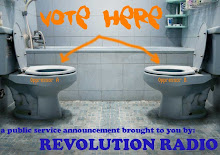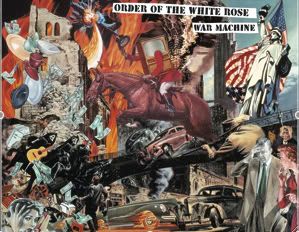Thoughts/debate on "V for Vendetta"
This is in response to an article "Putting Our Hopes Into Leaders: V for Vendetta vs. The Battle of Algiers" by Jamilah Hoffman on the website of World Can't Wait.
I very much disagree with this viewpoint. Unfortunately I don't have time to write a complete article about it (something I had wanted to do weeks ago, actually, & it's still not done now, so thank you for the motivation & here's some quick thoughts...)
Look, the movie isn't perfect. But it's pretty close. As the article points out, V does involve the masses. Yes it leans too much towards just him calling all the shots. But the fact is that his calls are simply for people to take action. Some do, some don't in the interim year. But on that second 5 Nov, *everybody* comes out in the streets. One should remember too that it's not as though everything is resolved at the end of the movie. In my mind at least the struggle would need to leap to a whole other level to completely take down the government, the events in the movie are just the beginning and a battle won but not the war. There is also to consider that movies generally focus on individuals and single events, for easier storytelling & as symbols. Which is a problem, though (1) not unique to V, (2) I'm not sure how you'd get around it in a 2 hour movie format, & (3) individual leaders & single cataclysmic events are important, after all. And yes there is a big question as to whether he is mainly motivated by justice or revenge, though clearly both are in the mix. But who said that just because it's fiction it has to be neat & tidy? These contradictions are real & I think it's much better viewing than some flat heroic stereotype.
As for "Battle of Algiers", that's one of my favourites too. I'd point out that it also focuses on a few individuals to follow the story, although yes it is obvious that there are many more involved, but I'm not sure to what extent this is obvious from the storytelling or to what extent it's from the historical knowledge that the viewer has. However the statement in Jamilah's article "The real life story of the Algerian people, as shown in The Battle of Algiers, answers that question in the freedom of the Algerian people from colonial rule," is really disturbing to me. The real life story is that despite their heroic triumph over the colonialists, they did not achieve freedom. Rather they traded oppressive colonialism for oppressive religious rule & eventually neo-colonialism under the very same French imperialists. Especially on the WCW site it is bad to promote the idea that the Algerian people achieved freedom, full stop, no disclaimers or further explanation. I say especially because one of the big questions/criticisms people have is "what happens after Bush is driven out, won't it be worse?" Now I disagree with that criticism of WCW, and also as a supporter of the RCPUSA I agree with its plan for revolution which is certainly something to set up a just society with, beyond the revolt against the unjust. But Algeria is exactly an example which would support the criticism, because maybe it wasn't worse but it certainly ain't good there now.
Back to V. I think that the demoralisaton of the people is actually quite a realistic portrayal. It is one reason why it's so necessary to stop fascism before it becomes full-blown. Look at the White Rose movement, people in Germany weren't scrambling to help out, neither were they all pro-Nazi, mostly they were scared &/or thought nothing was possible to be done. The main question in V is violence. This is what people are talking about after seeing it. This is what affected when the audience clapped or not, when they had shocked and thoughtful moments of silence. It even made Natalie Portman reconsider her thoughts on the Palestinian struggle. Is violence justified? Is there more than one kind of violence? V answers both these questions in a revolutionary way: violence is justified in certain conditions & in certain forms, that is revolutionary violence by the people against the oppressor.
"Battle of Algiers" is a great movie, but the history there is not what we want to repeat. On the one hand we want to forge our own path & not attempt to fit circles into squares or repeat mistakes, but also there are much better historical & contemporary examples anyway (Russia, China, Nepal...).
Frankly "V for Vendetta" is the best movie ever made. It doesn't have a perfect political line, but it has a damn good one. And its combination of that with wonderful artistic skill makes it extremely powerful.











